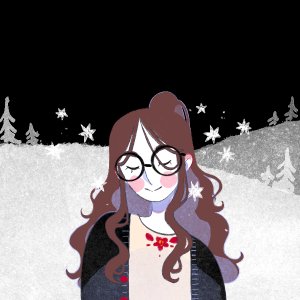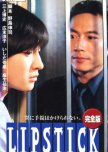This review may contain spoilers
Lipstick has a really interesting, atlhough a little far-fetched, concept. Psychological/healing type of drama in the prison-like juvenile center setting. 5 girls with different life experiences and traumas trying to move past that by learning more about themselves through each other. And a few wardens with similar emotional scars. What could have gone wrong? Well, a lot.
First of all, the whole juvenile center has a bizarre resocialization program. For some reason wardens plays the role of counselors/psychologist there. Nothing was said about their competency, but I don't think they should have such authority, because they clearly used the people they were supposed to help as a tools to help themselves, which is... totally wrong. Especially if you deal with kids/really young adults, as noone from the "inmates" was older than 20. If you use the vulnerable and lost person to explore your own trauma, then that's wrong. If you use violence to pass the point across to that person, then that's wrong. If you found out that a person was abused by their own family, then you should intervene and don't send that person back to their abuser, because that's wrong. I feel like the incompetence of those wardens/counselor caused more harm than good and it bothered me to my very core. I guess I was supposed to accept them as a human's fault or a institutional flaw, put some level of suspension of disbelief on it, but it all came off to me as just a lack of empathy and basic human decency. I couldn't put my own judgement and emotions aside and accept that whole thing as just a setting for figurative screen-play-like story about the importance of emotional connection or a story about "lost souls". One component (bizarre setting and its lack of logic) was overshadowing the other (the almost poetic story about the emotional bond).
That's also part of the reason why the relationship between Ai and Yu rubbed me the wrong way (aside from the clear power imbalance and age difference). It was portrayed as this profound, soulmate type of bond that transcends stereotypes/age/status, but to me it was really toxic, codependent and truly conceptual. I feel like Yu treated Ai as his Manic Pixie Dream Girl. It really was't about them learning how to grow through each other's support, but more about him coming to terms with his identity as an artist and overcoming his trauma through the idea of who, or what, Ai is. I feel like Ai didn't change at all through their journey. She was looking for acceptance and one could say that in the end she was accepted, not only by her new friends, but also by Yu who "saw her true self", but I can't agree with the latter. For him she was an affirmation of who he was, his muse, his motherly figure, his lover and the redeption of the guilt for the jealousy he felt for his brother. An idea.
With addition to my first paragraph I have to mention how unevenly handled some of the other girl's arc were. They were the true stars of this show and the only reason I sticked with the show till the very end. You get absolutely emotionally invensted in each girl's storyline and end up rooting for them. They are all very different and unique, but totally loveable. And their developing friendship the most heartwarming thing in this show. I actually liked that some storylines had an open and ambiguous ending (Poppo and Eriko), but some of them were totally underdeveloped (Anna) or just unecessary tragic (Mashiro). I actually wanted some kind of closure or definite stance on Anna's story, because this girl went through such an intense psychological manipulation, have done things she didn't want to, but... that was it. Her story stucked in the middle and didn't move past that. On the other hand Mashiro arc made me truly furious. Not because it ended like it did, but because there was no commentary about that situation. The girl was raped by her step-father, got an abortion because the bastard made her pregnant, and what people from the juvenile center did? What her counselors did? What doctors and lawyers did? Sent her right back to her "family", so after another rape the poor girl took her own life. And the show didn't do anything with that other than present it as a "sad reality". That could have been a critique of justice system, rape culture or collective ignorance when it comes to family issues, but no, it just happens sometimes. Yu felt some sort of remorse after that, but everyone else was silent. No responsibility for the rapist, no responsibility for the people who were supposed to protect Mashiro, no responsibility for government and law that didn't protect her. It just happens.
I loved the atmosphere of this show, it is something truly unique to those older jdramas. Something about hope, melancholy, sadness, bitersweetness and poetic way of desciribng one's emotions that you wouldn't see elsewhere. With that said, there is also a certain level of pretentiousness to it. Getting overboard with choirs, angel imagery, edgelord characters that are truly eye-rolling (Koki), you know what I mean. You either love it or hate it. It is kinda old-fashioned, but I personally really dig that vibe, so I didn't mind it that much here.
Aside from the girl's friendship and peculiar atmosphere I also really like the OST. Not only it fits the mood of the story perfectly, but it is also good on its own. If you like 80s ad 90s japanese pop, check out REBECCA asap.
In conclusion, I didn't regret watching this drama, when it was good it was really enjoyable. I just feel like they relied to much on the concept/abstract idea of the show. And because they wanted to incorporate that strong ideas into the semi-realistic setting, the whole thing is too heavy-handed, incohesive and edgy to enjoy it as a whole.
First of all, the whole juvenile center has a bizarre resocialization program. For some reason wardens plays the role of counselors/psychologist there. Nothing was said about their competency, but I don't think they should have such authority, because they clearly used the people they were supposed to help as a tools to help themselves, which is... totally wrong. Especially if you deal with kids/really young adults, as noone from the "inmates" was older than 20. If you use the vulnerable and lost person to explore your own trauma, then that's wrong. If you use violence to pass the point across to that person, then that's wrong. If you found out that a person was abused by their own family, then you should intervene and don't send that person back to their abuser, because that's wrong. I feel like the incompetence of those wardens/counselor caused more harm than good and it bothered me to my very core. I guess I was supposed to accept them as a human's fault or a institutional flaw, put some level of suspension of disbelief on it, but it all came off to me as just a lack of empathy and basic human decency. I couldn't put my own judgement and emotions aside and accept that whole thing as just a setting for figurative screen-play-like story about the importance of emotional connection or a story about "lost souls". One component (bizarre setting and its lack of logic) was overshadowing the other (the almost poetic story about the emotional bond).
That's also part of the reason why the relationship between Ai and Yu rubbed me the wrong way (aside from the clear power imbalance and age difference). It was portrayed as this profound, soulmate type of bond that transcends stereotypes/age/status, but to me it was really toxic, codependent and truly conceptual. I feel like Yu treated Ai as his Manic Pixie Dream Girl. It really was't about them learning how to grow through each other's support, but more about him coming to terms with his identity as an artist and overcoming his trauma through the idea of who, or what, Ai is. I feel like Ai didn't change at all through their journey. She was looking for acceptance and one could say that in the end she was accepted, not only by her new friends, but also by Yu who "saw her true self", but I can't agree with the latter. For him she was an affirmation of who he was, his muse, his motherly figure, his lover and the redeption of the guilt for the jealousy he felt for his brother. An idea.
With addition to my first paragraph I have to mention how unevenly handled some of the other girl's arc were. They were the true stars of this show and the only reason I sticked with the show till the very end. You get absolutely emotionally invensted in each girl's storyline and end up rooting for them. They are all very different and unique, but totally loveable. And their developing friendship the most heartwarming thing in this show. I actually liked that some storylines had an open and ambiguous ending (Poppo and Eriko), but some of them were totally underdeveloped (Anna) or just unecessary tragic (Mashiro). I actually wanted some kind of closure or definite stance on Anna's story, because this girl went through such an intense psychological manipulation, have done things she didn't want to, but... that was it. Her story stucked in the middle and didn't move past that. On the other hand Mashiro arc made me truly furious. Not because it ended like it did, but because there was no commentary about that situation. The girl was raped by her step-father, got an abortion because the bastard made her pregnant, and what people from the juvenile center did? What her counselors did? What doctors and lawyers did? Sent her right back to her "family", so after another rape the poor girl took her own life. And the show didn't do anything with that other than present it as a "sad reality". That could have been a critique of justice system, rape culture or collective ignorance when it comes to family issues, but no, it just happens sometimes. Yu felt some sort of remorse after that, but everyone else was silent. No responsibility for the rapist, no responsibility for the people who were supposed to protect Mashiro, no responsibility for government and law that didn't protect her. It just happens.
I loved the atmosphere of this show, it is something truly unique to those older jdramas. Something about hope, melancholy, sadness, bitersweetness and poetic way of desciribng one's emotions that you wouldn't see elsewhere. With that said, there is also a certain level of pretentiousness to it. Getting overboard with choirs, angel imagery, edgelord characters that are truly eye-rolling (Koki), you know what I mean. You either love it or hate it. It is kinda old-fashioned, but I personally really dig that vibe, so I didn't mind it that much here.
Aside from the girl's friendship and peculiar atmosphere I also really like the OST. Not only it fits the mood of the story perfectly, but it is also good on its own. If you like 80s ad 90s japanese pop, check out REBECCA asap.
In conclusion, I didn't regret watching this drama, when it was good it was really enjoyable. I just feel like they relied to much on the concept/abstract idea of the show. And because they wanted to incorporate that strong ideas into the semi-realistic setting, the whole thing is too heavy-handed, incohesive and edgy to enjoy it as a whole.
Was this review helpful to you?


 13
13 55
55 3
3























